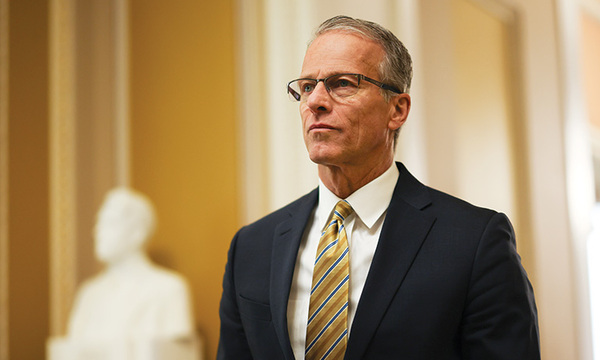In 1936, my grandfather Paul W. Rood, who was Biola’s president in the midst of a deep national depression, chose to celebrate Biola’s heritage with a special commemoration of Reuben A. Torrey. This commemoration involved the establishment of the annual “Torrey Memorial Bible Conference” and the ceremonial unveiling of a large bronze plaque honoring the service of R.A. Torrey, a giant figure of Biola’s founding era.
Unfortunately, the plaque included the statement “Biola’s first Dean.” At the time, many old-timers commented, “That’s not correct, William Blackstone was the first dean!” Written communication subsequently corrected this error, but the bronze plaque remains unaltered. Thus, nearly everyone today is unaware that William Blackstone, not R.A. Torrey, was Biola’s first dean.
But who was William Blackstone? It turns out that this “forgotten founder” of Biola has a fascinating story and a legacy of fruitful ministry, global adventure and historic impact.
William E. Blackstone (1841-1935) was a successful Chicago businessman who at midlife followed Jesus’ advice to the rich young ruler, literally giving away all — including his savings and a luxurious home — to devote himself fully to a life of Bible teaching, global evangelism and writing.
WEB (as he referred to himself) belonged to a prayer group of Chicago businessmen who financially supported the start of Moody Bible Institute in the 1880s. He came to the attention of Biola founder Lyman Stewart following the publication of his widely read prophetic book Jesus is Coming (1878), which sold millions of copies and was translated into more than 40 languages. He founded the first mission for Jewish evangelism in America, the Chicago Hebrew Mission, in 1887, and in 1888 he took a nine-month trip to the Holy Land that would change the direction of his life and greatly influence the modern history of the Jewish people and the Middle East. While there, he witnessed great throngs of suffering Jews who had recently been expelled from Russia, and was moved to support humanitarian efforts to resettle Jewish refugees in their ancient homeland.
"The Father of Zionism"
WEB’s concern was so great that in 1890 he held a “Conference of Christians and Jews on the Past, Present and Future of Israel,” attended by many of America’s most prominent Christian and Jewish religious leaders. The following year he issued “A Proclamation for a Homeland for Persecuted Russian Jews in Palestine,” which was signed by over 400 of America’s leading politicians and religious leaders and presented to U.S. President Benjamin Harrison and other heads of state.
Blackstone advocated a brand of Zionism that would carefully work to foster cooperation between Jews and Arabs to benefit all of the inhabitants of the region. He was aware of the potential for conflict and hoped that with good will and compassion, compromise would lead to blessing for all.
Twenty-five years later, Supreme Court Justice Louis Brandeis called Blackstone “the father of Zionism,” and asked him to reissue his 1891 petition — known as the “Blackstone Memorial” — to President Wilson because it was, in his view, the best expression of humanitarian compassion toward the persecuted Jewish refugees and their human rights claims for a secure national homeland.
Today, Blackstone’s deep compassion for the Jewish people is commemorated in Jerusalem in the “Blackstone Grove” in the Jewish National Forest. The Israel State Archive holds a Hebrew Bible given by Blackstone to Theodore Herzl, the founder of Zionism. In it, Blackstone had marked for Herzl’s reference all the passages concerning the future fulfillment of the spiritual promises and blessings a restored Israel would experience in their own homeland when they recognize their Messiah.
Blackstone's Biola Years
After relocating to Los Angeles in 1902, WEB began his long partnership with Lyman Stewart. On Feb. 25, 1908, WEB was among the small group of evangelical leaders in Los Angeles who met together in a prayer meeting for the founding of Biola. WEB served as a founding trustee, officer and dean of the educational program. The practical ministry programs of Biola were already significant, with street evangelism, rescue missions and urban ministries to dockworkers, homeless, factory workers and the Hispanic and Jewish communities. The educational program was relatively simple: Bible instruction, practical Christian worker training and basic Christian doctrine.
WEB gave special attention to the development of a “Jewish Department” and taught a weekly missions course to train “colporteurs” and “witnessing bands” to serve Los Angeles and the wider world as “direct ambassadors of the Gospel message of salvation to doomed humanity.” From late 1909 to early 1914, WEB was stationed as the special representative of Biola and the Lyman and Milton Stewart World Evangelization Trust in China, posting generally in the cities of Nanking, Kuling and Shanghai. During these years, WEB traveled widely throughout China, Korea, Burma, India, Persia, Mesopotamia, Palestine, Egypt, Turkey and Eastern Europe, where he identified and paid for many young indigenous Christian leaders to come to Biola for training in gospel work to bring back to their home countries.
WEB also served as Biola’s liaison to the evangelical “faith” missions, helping to establish Biola graduates as missionaries and Bible Institute teachers in the foreign fields. One of his projects involved the translation and printing of Scripture portions and the distribution by trained “witnessing bands” into every village and home in two inland provinces of China: Hunan and Kiangsi. Out of this project, under the leadership of veteran missionary Frank Keller, the Hunan Bible Institute was started, a Biola sister institution
in interior China.
In 1912, while WEB was stationed overseas, Stewart recruited the prominent evangelist and educator R.A. Torrey to become Biola’s dean, with responsibilities over an expanding program of training that would be incorporated into the magnificent new Bible Institute building currently under construction. When WEB returned from China in 1914, he continued to serve as an active trustee, helping Biola through many of its early challenges. He also served as a member of the governing “Society” that elected the trustees and had sole authority over the bylaws and articles of incorporation.
For the following two decades, WEB served as the trustee of the Stewart Evangelization Trust, determining how assets would best be invested for global Scripture translation and distribution, the establishment of local Bible training schools, and support of missionaries primarily to the unreached Asians, Muslims and Jews.
At the time of his death in 1935, WEB was the patriarch of a large multigenerational family of committed Christians, including those serving on the mission fields of China. He is remembered for his devotion to God’s people Israel, his longing for Jesus’ return and for his deep humility.
And though his name has not been as prominent in Biola’s memory as it ought to have been, I am sure he wouldn’t mind, for he deferred all acclaim and frequently closed his letters with the statement, “I am but an errand boy for Jesus.” But what joy he found in running these errands!
Paul Rood, a retired corporate executive and lecturer in politics and economics at Biola, is currently writing a comprehensive biography of Lyman Stewart, founder of Biola and the Union Oil Company. Rood's grandfather, Paul W. Rood, served as Biola's third president from 1935 to 1938. In the course of his research, he has presented papers and published articles on other figures who played a prominent role in the founding era of Biola.
 Biola University
Biola University


